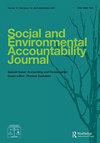There Should be More Normative Research on How Social and Environmental Accounting Should be Done
Q2 Business, Management and Accounting
Social and Environmental Accountability Journal
Pub Date : 2022-05-04
DOI:10.1080/0969160X.2022.2066554
引用次数: 7
Abstract
ABSTRACT I suggest that the SEA research community has not engaged significantly with the Intergovernmental Panel on Climate Change because our community generally does not offer normative policy-focused advice on how to account for climate change. This raises the question ‘Why not?’. It cannot be because there is no demand for normative accounting guidance, as examples of this need abound everywhere. And it cannot be because normativity is ‘not academic’ as other academic disciplines engage in normative research, notably the fields of economics and life cycle assessment. The SEA research community may be constrained by its social constructivist epistemology, its focus on explanatory theory which drives us towards explanatory rather than normative questions, and our training in social science research methods rather than direct engagement with how to do social and environmental accounting. Notwithstanding the challenges there is a pressing need for better accounting practice, and who better to develop methods for social and environmental accounting than the social and environmental accounting research community? Arguably, there should be more normative research on how social and environmental accounting should be done.社会与环境会计应如何进行规范性研究
我认为东南亚研究界没有与政府间气候变化专门委员会进行重大合作,因为我们的社区通常不会就如何解释气候变化提供规范性的政策建议。这就提出了一个问题:“为什么不呢?”这不可能是因为没有对规范会计指导的需求,因为这种需求的例子比比皆是。这不可能是因为规范性是“非学术性的”,因为其他学科从事规范性研究,特别是经济学和生命周期评估领域。SEA研究界可能受到其社会建构主义认识论的限制,其对解释理论的关注将我们推向解释性问题而不是规范性问题,以及我们在社会科学研究方法方面的培训,而不是直接参与如何进行社会和环境核算。尽管面临挑战,但迫切需要更好的会计实践,谁能比社会和环境会计研究界更好地开发社会和环境会计方法呢?可以说,应该对如何进行社会和环境会计进行更多的规范研究。
本文章由计算机程序翻译,如有差异,请以英文原文为准。
求助全文
约1分钟内获得全文
求助全文
来源期刊

Social and Environmental Accountability Journal
Business, Management and Accounting-Accounting
CiteScore
3.90
自引率
0.00%
发文量
16
期刊介绍:
Social and Environmental Accountability Journal (SEAJ) is the official Journal of The Centre for Social and Environmental Accounting Research. It is a predominantly refereed Journal committed to the creation of a new academic literature in the broad field of social, environmental and sustainable development accounting, accountability, reporting and auditing. The Journal provides a forum for a wide range of different forms of academic and academic-related communications whose aim is to balance honesty and scholarly rigour with directness, clarity, policy-relevance and novelty. SEAJ welcomes all contributions that fulfil the criteria of the journal, including empirical papers, review papers and essays, manuscripts reporting or proposing engagement, commentaries and polemics, and reviews of articles or books. A key feature of SEAJ is that papers are shorter than the word length typically anticipated in academic journals in the social sciences. A clearer breakdown of the proposed word length for each type of paper in SEAJ can be found here.
 求助内容:
求助内容: 应助结果提醒方式:
应助结果提醒方式:


